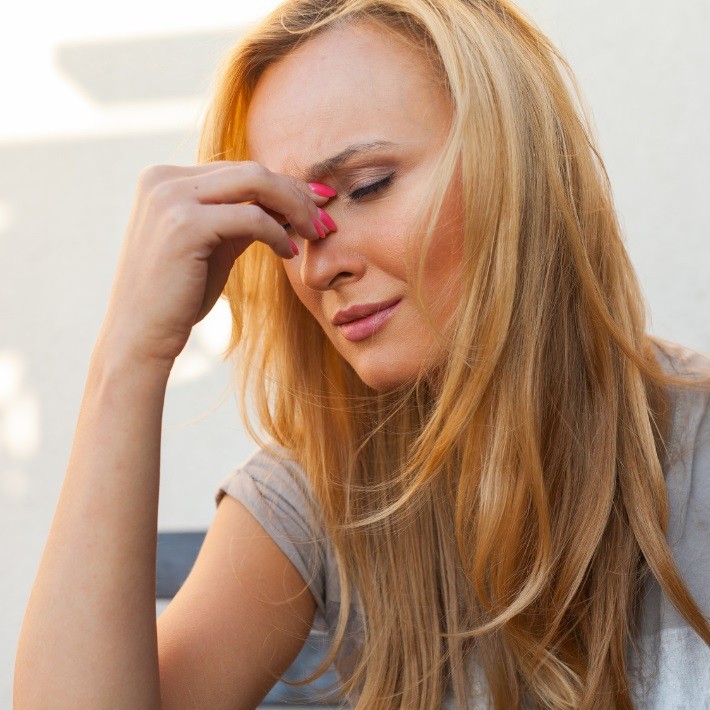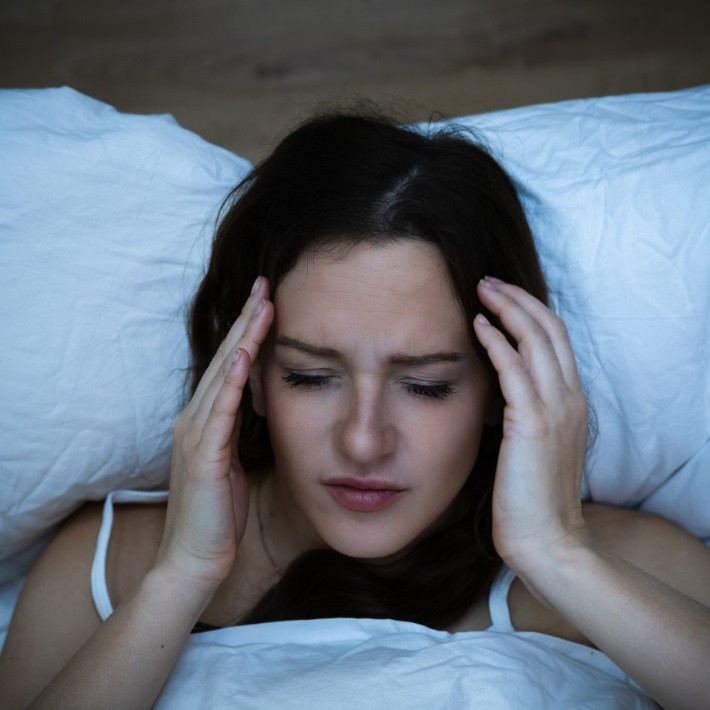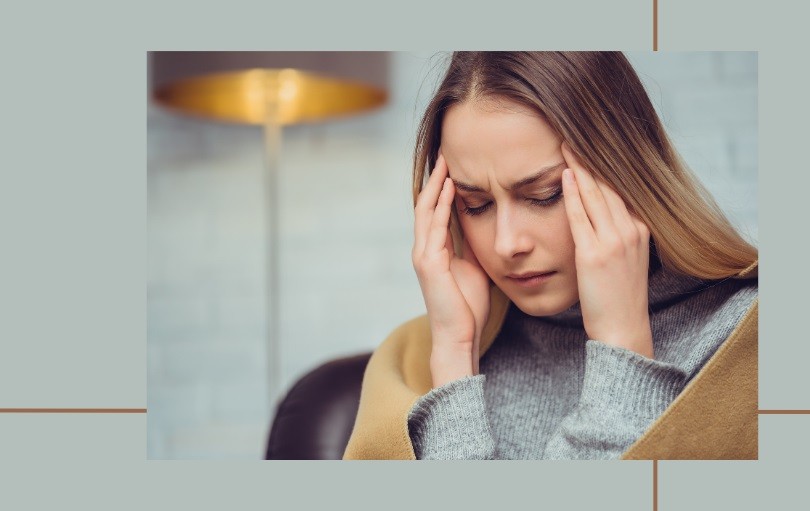Last Updated on March 28, 2025
Yes, long hair can cause headaches due to the weight and tension on the scalp and hair follicles. Long hair puts strain on the neck and scalp muscles, leading to headaches.
Long luscious locks may look beautiful, but it comes with their downsides as well. One of which is the likelihood of getting headaches. It’s not uncommon for people who grow their hair long to experience discomfort from the weight of their hair pulling on their scalp.
The constant tension and strain on the neck and scalp muscles can cause headaches. This is especially true for those who wear their hair up in tight hairstyles like ponytails or braids. We’ll take a closer look at the relationship between long hair and headaches, the causes of headaches due to long hair, and what you can do to avoid or alleviate them.
The Science Behind Hair And Headaches

Long hair is a popular style choice for many people, but have you ever wondered whether it could potentially lead to headaches? It’s a question that’s been explored by medical professionals, and the answer may surprise you. In this blog post, we’ll dive into the science behind hair and headaches to help you better understand the potential relationship between the two.
Related: Can You Get A Perm While Pregnant?
Introduction To Hair Anatomy
Before we dive into how hair length could impact headaches, it’s important to understand the anatomy of hair. Hair is made up of a protein called keratin, which grows from hair follicles located on the scalp. Each strand of hair has three layers: the cuticle (outermost layer), the cortex (middle layer), and the medulla (innermost layer).
The cuticle is a protective layer that can be damaged by various factors such as heat styling or chemical treatments.
How Headaches Occur
Headaches can occur for a variety of reasons, such as stress, dehydration, or lack of sleep. In some cases, headaches can be caused by tension in the muscles of the head and neck. When these muscles become tense, they can put pressure on nerves and blood vessels in the head, leading to pain and discomfort.
Additionally, headaches can also be caused by conditions such as migraines or sinus infections.
How Hair Length Could Potentially Impact Headaches
It is thought that the weight of long hair could potentially contribute to headaches in some individuals. This is because the weight of hair can pull on the scalp and neck muscles, causing tension and strain. Additionally, long hair may make it more difficult to maintain good posture, which can also contribute to headaches.
It’s worth noting that not everyone will experience headaches due to the weight of their hair, and the severity of headaches can vary greatly from person to person.
Relevant Research Studies And Findings On The Topic
Despite the potential relationship between long hair and headaches, there is limited scientific research on the topic. A study published in the journal Cephalalgia in 2011 found that women who wore their hair in tight ponytails or buns were more likely to experience headaches than those who wore their hair down.
The study also found that women who regularly wore their hair in tight hairstyles were more likely to experience scalp tenderness.
Overall, it’s important to note that the impact of hair on headaches can vary from person to person. If you are experiencing headaches and suspect that your hair may be contributing to the issue, consider experimenting with different hairstyles or lengths to see if it makes a difference.
Additionally, if your headaches are severe or frequent, it’s always a good idea to consult with a medical professional to rule out any underlying conditions.
Related: Do Highlights Damage Hair?
Different Types Of Headaches Linked To Long Hair
Tension Headache And Its Relation
Tension headaches are the most common type of headache that people experience. According to some studies, there might be a relationship between hair length and tension headaches. Here are some of the key points to consider:
- Tension headaches are often caused by prolonged muscle tension in the neck and scalp region. Hair that is tied up tightly (e.g., in a ponytail, bun, or braids) may cause this muscle tension, leading to a headache.
- Hair accessories that are too tight (e.g., headbands, hair clips, or hair ties) can cause tension headaches.
- People with long hair who wear heavy hair extensions or weaves for an extended period might cause muscle tension, leading to tension headaches.
Migraine And Its Potential Connection
Migraines are another type of headache that can be triggered by long hair. Though the evidence for this link is anecdotal, many people with the condition believe that long hair aggravates their headaches. Here are some of the main points to note:
- Long hair requires more intensive grooming, such as regular washing, brushing, and styling, which can be stressful experiences for migraine sufferers.
- Migraine sufferers may be more susceptible to stimuli such as light, sound, and smells, all of which may be caused by the movement of hair on the head.
- In rare cases, wearing heavy hair extensions or weaves may trigger a migraine attack due to the added weight and tension on the scalp.
Other Types Of Headaches
Apart from tension headaches and migraines, there are other types of headaches that may be associated with long hair. They include:
- Occipital neuralgia: This condition is caused by compressed or irritated occipital nerves that arise from the base of the neck and scalp. Long hair that is constantly brushing against the back of the neck could potentially trigger this condition.
- Allergic reactions: Hair products such as dyes, shampoos, and conditioners may contain allergens that trigger headaches in susceptible individuals.
- External compression cephalalgia: This is a headache caused by external sources of compression on the head, such as wearing a helmet, hats, or headbands that are too tight. Wearing tight hair accessories may also trigger this type of headache.
While long hair may be beautiful to look at, it can contribute to several types of headaches. Therefore, it is essential to be mindful of how you wear and style your hair to reduce the risk of developing headaches. Speak to a medical professional if you experience frequent or severe headaches.
Tips For Preventing Hair-Related Headaches

Related: Do Perms Cause Hair Loss?
Hair Styling Tips For Reducing The Risk Of Headaches
- Avoid tight hairstyles such as high ponytails, braids, and buns.
- Use a scrunchie instead of an elastic hairband.
- Limit your use of hair extensions and heavy hair accessories.
- Keep your hair loose and free-flowing whenever possible.
- Use hair clips instead of tight hairbands to secure loose hair.
Considerations When Choosing Hair Accessories
- Consider the weight of the hair accessory before purchasing.
- Choose hair accessories made of lightweight materials such as fabric or plastic.
- Avoid hair accessories made of metal or heavy materials like leather.
- Use hair accessories that do not tug on your scalp.
- Always remove hair accessories before going to bed to avoid scalp stress.
Lifestyle Changes That Can Reduce Hair-Triggered Headaches
- Regularly wash your hair to prevent buildup that adds weight and stress to your scalp.
- Maintain a healthy diet with adequate water intake to keep your hair healthy.
- Get frequent haircuts to avoid excessive hair weight.
- Practice stress-reducing activities such as meditation, yoga, or deep breathing.
- Try acupuncture or massage to alleviate scalp tension.
Headache Management Techniques That Can Address Symptoms
- Use a cold compress or ice pack on your forehead or scalp to relieve pain.
- Take over-the-counter pain medications such as ibuprofen or acetaminophen.
- Practice relaxation techniques such as deep breathing exercises.
- Try applying peppermint oil to your temples or scalp for a soothing effect.
- Keep a headache diary to track your triggers and symptoms.
Long hair can cause headaches, but taking preventative measures can reduce the risk. By following hair styling tips, choosing lightweight accessories, making lifestyle changes, and trying headache management techniques, you can reduce the occurrence of hair-triggered headaches. So, rock your long locks without worrying about headaches!
Related: Do Highlights Damage Hair?
Frequently Asked Questions
Can Having Long Hair Cause Headaches?
Yes, it can. The weight of hair strains the scalp muscles, leading to tension headaches.
How Do I Prevent Headaches From Long Hair?
You can tie your hair in a loose bun or ponytail, use a silk scrunchie, and keep your hair healthy and trimmed.
What Is The Best Hairstyle For Preventing Headaches?
Loose braids or a low ponytail are ideal. Avoid tight hairstyles and buns that can cause scalp tension.
Should I Cut My Hair If I Have Frequent Headaches?
It’s not necessary to cut your hair completely, but a trim can relieve some of the weight on your scalp and prevent headaches.
Are There Any Other Causes Of Headaches Besides Long Hair?
Yes, other factors like diet, stress, dehydration, and eye strain can cause headaches. It’s important to identify the cause to find a solution.
Conclusion
After reviewing various studies and anecdotal evidence, it appears that long hair can indeed cause headaches in some individuals. The reasons for this include tension on the scalp, nerves, and muscles, as well as the weight of the hair pulling on the scalp.
While not everyone with long hair will experience headaches, those who do can try preventative measures such as wearing a loose hairstyle or using a scalp massager to relieve tension. In severe cases, cutting hair to a shorter length may be the best solution.
Overall, it’s important to listen to your body and make choices that prioritize your health and well-being, even if that means sacrificing some length in your locks. Remember, a good hairstyle is one that makes you feel confident and comfortable, not one that causes pain and discomfort.

